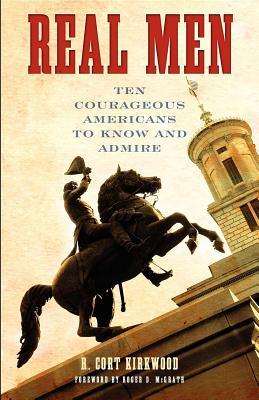There is no question that the concept of manhood is a shell of what it once was. In popular culture, men are depicted as being slightly dim-witted, obsessed with video games, sports, and fast food. “Guys,” we are told, rush to Hardees because they can’t fix their own breakfast. Although one can see a great deal of macho posturing on the set of an NFL pre-game show or pickup commercial, outside of R. Cort Kirkwood’s new book, real men are hard to find these days.
Kirkwood places considerable blame on Hollywood for the collapse of manhood but notes that “men were in charge when the foes of masculinity and manhood marched by in the night and sacked our institutions . . . ” He paraphrases Garet Garrett, the uncompromising critic of the New Deal: “Some still believe they hold the pass against a revolution that may be coming up the road. But they are gazing in the wrong direction. The revolution is behind them.”
Although the reasons are no doubt very complex, I would place considerable blame on the postwar prosperity that removed much of the struggle from life. Material comforts are widely available, and few men do rough physical labor these days. Prosperity is good, but the downside is that, as life becomes easier, it has a tendency to become less satisfying. This is evident in the desire for physical challenge among the stockbrokers and lawyers who engage in dangerous activities, such as mountain climbing, for sport.
Kirkwood intends to keep the flame of manhood alive by remembering sterling examples of the past. Real Men is a collection of ten profiles from American history—nine of whose subjects the culturally literate reader will at least have heard of. The tenth is Rocky Versace, an American soldier executed by the North Vietnamese in 1965. The list is dominated by men who fought in wars, but raw physical courage isn’t the only characteristic of Kirkwood’s subjects, who tended also to exhibit a tremendous sense of leadership and piety.
One who stands out is Lou Gehrig. Today, professional sports is a repugnant spectacle that extends from thuggish players (“the criminal, the crybaby, or the steroidically fortified multimillionaire”) to clownish owners, coaches, and commentators. (Kirkwood contrasts Gehrig’s dignity with a more recent and mercifully unnamed player who threw a crying fit upon failing to be elected to the National Baseball Hall of Fame at Coopers-town.) Lou Gehrig’s claim to fame over and above his greatness as a player—especially the 2,130 consecutive-game streak that remained a major-league record for more than 50 years—was the way he handled his fate when he was diagnosed with amyotrophic lateral sclerosis. It is difficult to face such a painful, and painfully unfair, death with dignity and courage, yet Gehrig did so in public.
Audie Murphy is another of Kirkwood’s real men. His exploits in battle well qualify him—Murphy was the most highly decorated American soldier of World War II—for this honor. Murphy’s story is classically American. He grew up as the son of sharecroppers in Texas, in a family so poor that Audie was “one Texan who never had a pair of cowboy boots.” When the United States entered World War II, Murphy joined the Army after the Marine Corps found him to be too scrawny. So great were Murphy’s feats in combat that Kirkwood suspects most readers would find their depiction unbelievable and inauthentic if they appeared in fiction.
The postwar Audie Murphy whom Kirkwood describes is a man who looked for trouble—and often found it. He once pulled a gun on a “Dago” at a horse track (Murphy had problems with gambling) and told him that killing one more Italian wouldn’t make any difference to him. On a Hollywood movie set, Murphy, who had appeared in a number of films, was annoyed by an actor who flattered himself as a quick draw. Murphy offered to prove his skills using live cartridges. Kirkwood writes that a
fair appraisal of Murphy’s postwar deeds might suggest a physiologically troubled man. To some degree he was. He suffered nightmares and became addicted to sleeping pills, but ever the tenacious warrior, he locked himself in a hotel room and defeated the addiction. He candidly discussed the psychological damage war inflicts on a man, openly trying to help other veterans overcome what was then called battle fatigue and now called post-traumatic stress disorder. War took its toll on Murphy and thousands of other combat veterans.
In his famous essay “The Moral Equivalent of War,” William James wrote that “Militarism is the great preserver of our ideals of hardihood, and human life with no use for hardihood would be contemptible.” James favored sending young men to something akin to a Civilian Conservation Corps to develop the manly virtues, after which “they would tread the earth more proudly, the women would value them more highly, they would be better fathers and teachers of the following generation.” Kirkwood notes that the subjects of Real Men were made by the “cultural milieu in which they are raised.” When the President (who preferred political campaigning to fulfilling his obligations to the National Guard) and his hawkish neoconservative Vice President (a serial draft dodger) are happy to send American boys and girls to die for “democracy” in the Middle East, it is safe to say that our culture is no longer hospitable to James’ “ideals of hardihood.”
Instead, our culture is hospitable to metrosexuals, swooning neocons, Xbox geeks, and graying perpetual adolescents. Kirkwood’s book reminds us of real men—and the culture that produced them.
[Real Men: Ten Courageous Americans to Know and Admire, by R. Cort Kirkwood (Nashville: Cumberland House) 188 pp., $12.95]

Leave a Reply